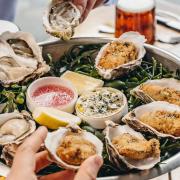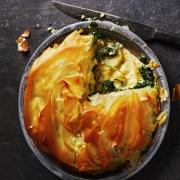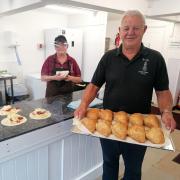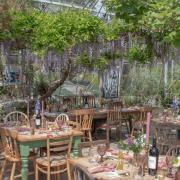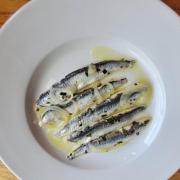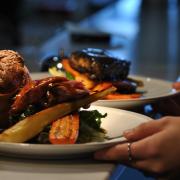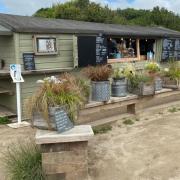Britain is currently the world’s fastest-growing wine region. The number of vineyards here has grown by almost 75 per cent in the past five years, making grapes the fastest-growing edible agricultural crop sector in England (according to Defra).
While Cornwall is home to only a handful of these vineyards, the county’s influence on England’s wine scene has been no less significant. To celebrate English Wine Week (June 15 to 23), here’s a closer look at some of the county’s leading vineyards and how you can pay a visit.

The new kids on the block
Caroline Roper and James Snelgrove are the proud owners of Cornwall’s newest vineyard, situated just outside Cornwall.
Formerly an entrepreneur and innovation consultant, the 36-year-olds, who share two children, Freddie, 5, and Florence, 20 months, decided to move to the north Cornish coast having holidayed in the area with their respective families when young.
‘Neither of us have any background in farming or wine production but we certainly do enjoy a good glass of wine, which is where the idea was first born,’ says Caroline. ‘We are an adventurous family and wanted to embark on a project that had a long-term meaning and positive environmental impact, that would also give us an opportunity to learn and grow together.’
The family planted 7.5 acres of vines on a 30-acre traditional farm site they bought in 2021, naming it The Atlantic Vineyard because you can see the Atlantic Ocean from the plot.
‘The field was previously used for potato and barley farming and we still dig up the odd potato now,’ laughs James.
Making ‘good wine which is good for the planet’ is central to the ethos of the vineyard and Caroline and James have spent a lot of time creating wildlife havens that enhance the natural biodiversity of the vineyard and provide a therapeutic haven for visitors.
‘We are passionate about working in harmony with the natural ecology and landscape and this influences our viticultural approaches as well,’ explains Caroline. ‘We like to think of ourselves as an ‘experimental and innovative vineyard’ and took the decision to plant 14 varieties of a new hybrid vine that we imported from Europe and have trademarked as Earth-Friendly Vines.
These new varieties of vines, which are more commonly known as PilzWiderstandsfähig (or PIWI) varieties have been cultivated for their quality, character, hardiness and natural disease resistance.
‘This means we are able to avoid using harmful chemicals and pesticides in the vineyard, meaning we are naturally organic, and ecologically friendly,’ adds James.
The couple plan to make a selection of red, white, rosé and sparkling wines, as well as a non-alcoholic alternative and will be open to visitors from this summer.
theatlanticvineyard.co.uk

The experimentalists
Over the past 20 to 30 years, England has made a name for itself producing sparkling wine from the ‘holy trinity’ Champagne varieties – Chardonnay, Pinot Noir and Pinot Meunier.
Before that, most vineyards focused on making still wines from Germanic grape varieties, such as Bacchus, Huxelrebe and Ortega.
However, as the country’s wine industry has grown, some vintners have been much more experimental, both in terms of different winemaking techniques and the variety of grapes grown.
Knightor, in St Austell, is one such vineyard, where innovative winemaker David Brocklehurst is not afraid to push boundaries by working with grapes scarcely grown in the UK.
In 2023 Knightor produced an ‘orange’ Muscat, which gets its colour from the skins being in contact with the juice while it ferments, and this year they released a Riesling, one of the first in the UK to do so. David also makes a Merlot-Cabernet Sauvignon blend from grapes grown under cover because neither variety will usually ripen in England’s cool climate.
Knightor, which grows vines in Trethurgy and Portscatho, does however also produce more classic styles of wine and, to mark English Wine Week, has launched a very special vintage cuvee made from the vineyard’s best parcels of Pinot Noir and Chardonnay from 2014.
Guided tours of the St Austell winery take place every Sunday at midday from April to September and cost £20 per person and at the Portscatho vineyard, where their pop up The Vine restaurant runs from May to September (£15 per person).
knightor.com

The organic overnighters
In 2008, Trevibban Mill owners Engin and Liz Mumcuoglu were inspired by Engin’s grandfather, who had a vineyard in Eastern Turkey, to plant vines in the Issey Valley, just outside the renowned fishing village of Padstow. Since then, they have built a state-of-the-art winery and bar with seating among the vines, became a wedding venue, were certified organic and, this year, launched two new self-catered lodges.
The one-bedroom chalets, named Winemaker’s Lodge and Cicero Lodge after the family’s chihuahua, feature a King-size bed, kitchen, bathroom, private garden patio, and welcome hamper of the vineyard’s wine and cider, local artisanal bread, butter and organic hummus, which is also made on site by Engin and Liz’s son Thomas’s company, Themptation.
Barnaby’s, the Michelin-listed sister restaurant to Padstow’s Prawn on the Lawn, has also taken up permanent residency at Trevibban Mill, serving small plates and larger daily specials of local produce with a hint of Middle Eastern or North African spicing.
Minimal intervention and biodiversity are at the heart of Trevibban Mill and all their grapes are grown using organic and regenerative agriculture methods in the vineyard. They also experiment with winemaking techniques to produce some unique wines such as their Pét-Nat Sparkling Wine made from Dornfelder.
‘This is the oldest method of making a sparkling wine and is also known as method ancestrale,’ explains Liz. ‘Our pét nat is made from a red grape giving it a beautifully deep pink colour and has flavours of red berry, cherry sours and vanilla.’
Winery tours run on Wednesday, Thursday and Saturday at 3pm, cost £25 per person and include a tasting of five wines. trevibbanmill.com

The Royal approved
Loved by locals, including celebrity chef Rick Stein, and wine critics alike (columnist Matthew Jukes has regularly gone on record claiming it is England’s finest wine estate), Camel Valley is a bit of a Cornish institution.
The vineyard, which sits halfway between Wadebridge and Bodmin on the Camel Trail, has been producing award-winning English wines since ex-RAF pilot Bob Lindo and his wife, Annie, planted their first eight thousand vines in 1989.
Indeed, it was Bob who was responsible for the idea behind English Wine Week over a decade ago.
‘English Wine Week was an idea I had to help another producer friend who wasn’t having any success attracting visitors,’ he says. ‘It was inspired by a job I had when I was 16 and was working as an apprentice in a telephone exchange. The exchange opened up to visitors during Telephone Fortnight and, to my amazement, the public came in droves and queued round the block! So, we created an English Wine Week, and it all grew from there.’
In 2018, Camel Valley made history by becoming the first English wine producer to be given a Royal Warrant. The same year, Bob’s commitment to the English wine industry was recognised with a lifetime achievement award at the International Wine Challenge.
Bob isn’t the only one to have been adorned with accolades for his work, however. Bob and Annie’s son, Sam, who took over winemaking at Camel Valley in the early noughties, has been named ‘UK Winemaker of the Year’ three times and was the first English winemaker to be shortlisted for the international Sparkling Winemaker of the Year award.
Annie’s valuable contribution has not gone unnoticed either. Indeed, there are very few vineyards in the world that have only ever been pruned by just one person and the 5,000 vines that make up one section of the Camel Valley estate – aptly named Annie’s Vineyard – have only been pruned by her. To commemorate her 100,000th vine pruned and her 20th vintage, Sam made a special anniversary cuvee, called Annie’s Anniversary’ Brut. The 2018 vintage recently won gold at last year’s International Wine Challenge competition.
Guided tours of the vineyard take place at 10:30am from Monday to Friday and include a wine flight of four flagship wines (£18pp). They also host a Grand Tour (£25pp) each Wednesday evening at 5pm with a tasting of at least five wines. camelvalley.com




